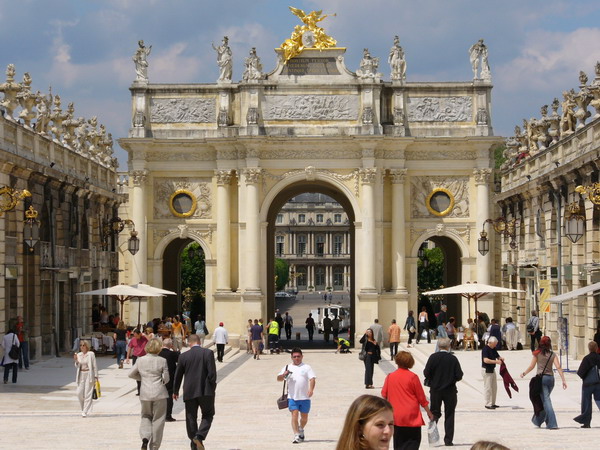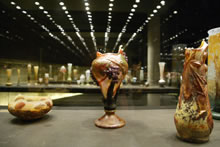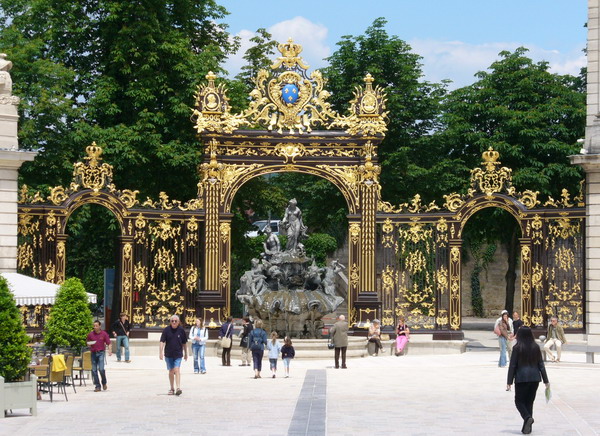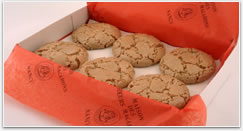Located in the Meurthe-et-Moselle department in north-eastern France, Nancy has a layered history that is reflected in its culinary culture, art nouveau history and the interesting organization of the city itself.
How to get to Nancy
 Since June 2007, it has been possible to take the TGV from Paris’ Gare de l’Est directly to Nancy. At 90 minutes each way, Nancy is a perfect day trip from the City of Lights.
Since June 2007, it has been possible to take the TGV from Paris’ Gare de l’Est directly to Nancy. At 90 minutes each way, Nancy is a perfect day trip from the City of Lights.
What to see in Nancy
Nancy’s multifaceted history is reflected in the layout of the city. Like most cities in Europe, Nancy has a new town and an old town. What is unique to Nancy is the city center, developed in the 18th century by Duke Stanislas to connect the old town to the new town. Though all of Nancy is lovely, my favorite historic sites are found in the city center and the old town.
 The city center is comprised of three grand places (squares) on the esplanade that had replaced part of the old city’s ramparts, Place de la Carrière, Place Royale (today known as Place Stanislas) and Place d’Alliance. Place Stanislas, the most famous of the three, is a prime example of Classical French architecture. Famous buildings surrounding the square include the City Hall, the Theatre-Opera House, the Fine Arts Museum. The Tourism Office, where you can pick up handy maps and other information, is in a building on the southern side of Place Stanislas. I highly recommend Le Musée des Beaux-Arts de Nancy (3, place Stanislas). Here, you will find a lovely collection of Art Nouveau pieces as well as works from famous artists of the 19th and 20th centuries, including Manet, Matisse, Monet, and Picasso. The Ecole de Nancy Museum is totally dedicated to the Art Nouveau movement in Nancy. Not only does the museum house works of art and crafts, it has a beautiful garden, an oasis of flowers and fountains.
The city center is comprised of three grand places (squares) on the esplanade that had replaced part of the old city’s ramparts, Place de la Carrière, Place Royale (today known as Place Stanislas) and Place d’Alliance. Place Stanislas, the most famous of the three, is a prime example of Classical French architecture. Famous buildings surrounding the square include the City Hall, the Theatre-Opera House, the Fine Arts Museum. The Tourism Office, where you can pick up handy maps and other information, is in a building on the southern side of Place Stanislas. I highly recommend Le Musée des Beaux-Arts de Nancy (3, place Stanislas). Here, you will find a lovely collection of Art Nouveau pieces as well as works from famous artists of the 19th and 20th centuries, including Manet, Matisse, Monet, and Picasso. The Ecole de Nancy Museum is totally dedicated to the Art Nouveau movement in Nancy. Not only does the museum house works of art and crafts, it has a beautiful garden, an oasis of flowers and fountains.
 Nancy’s old town dates from the Middle Ages to the 18th century. The Craffe Gate serves as an impressive entrance into the old town. The original structure was built at the end of the 14th century as a part of the large walls surrounding the town. The twin towers on either side of the gate were an addition at the end of the 15th century and were used as prisons until the end of the 17th century.
Nancy’s old town dates from the Middle Ages to the 18th century. The Craffe Gate serves as an impressive entrance into the old town. The original structure was built at the end of the 14th century as a part of the large walls surrounding the town. The twin towers on either side of the gate were an addition at the end of the 15th century and were used as prisons until the end of the 17th century.
Another interesting sight in the old town is the Duke’s Palace, originally constructed in 1502. The palace was destroyed and rebuilt several times throughout the 17th-19th centuries. It now serves as a museum and visitor’s center.
Where and what to eat in Nancy
 Foods typical to Nancy include the famous quiche Lorraine (a traditional egg quiche with ham and cheese) and macaroons (almond flavored cookies). For a tasty quiche Lorraine, I recommend Nathalie Lalonde , a pastry shop and casual eatery. The best (and reportedly the first) macaroons in Nancy can be found at the candy shop Maison des Soeurs Macarons.
Foods typical to Nancy include the famous quiche Lorraine (a traditional egg quiche with ham and cheese) and macaroons (almond flavored cookies). For a tasty quiche Lorraine, I recommend Nathalie Lalonde , a pastry shop and casual eatery. The best (and reportedly the first) macaroons in Nancy can be found at the candy shop Maison des Soeurs Macarons.
A trip to Nancy would not be complete without a stop at L’Excelsior, a 100-year-old brasserie (50, rue Henri-Poincaré). Its contemporary regional cuisine delights (oysters, unique quiches, decadent desserts) just as much as its early 1900s interior (complete with molded ceilings, a period piano, white tablecloths, stained-glass windows, and brass accents).


Comments